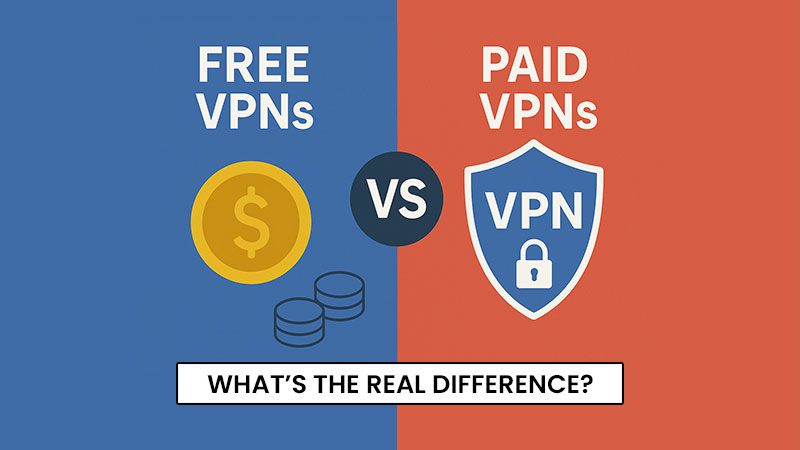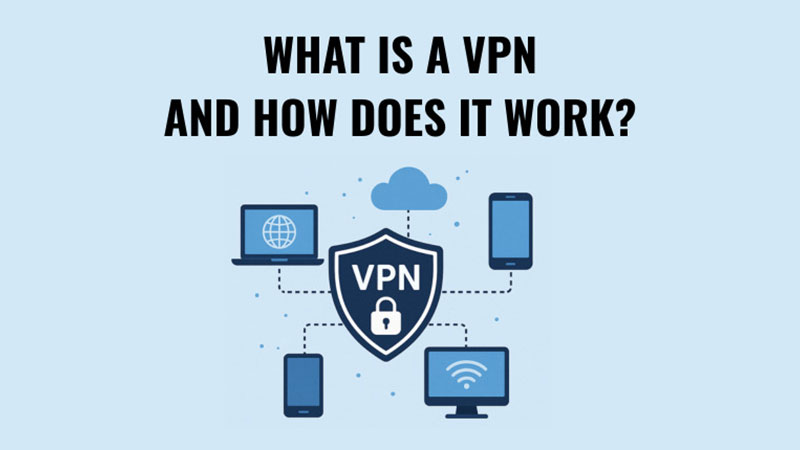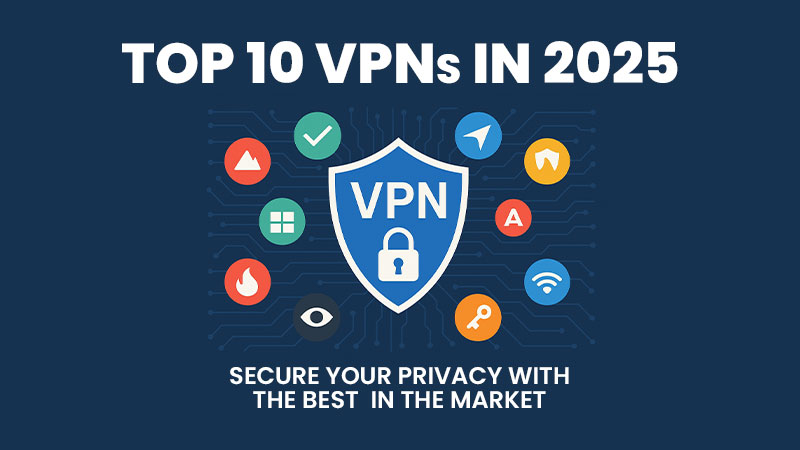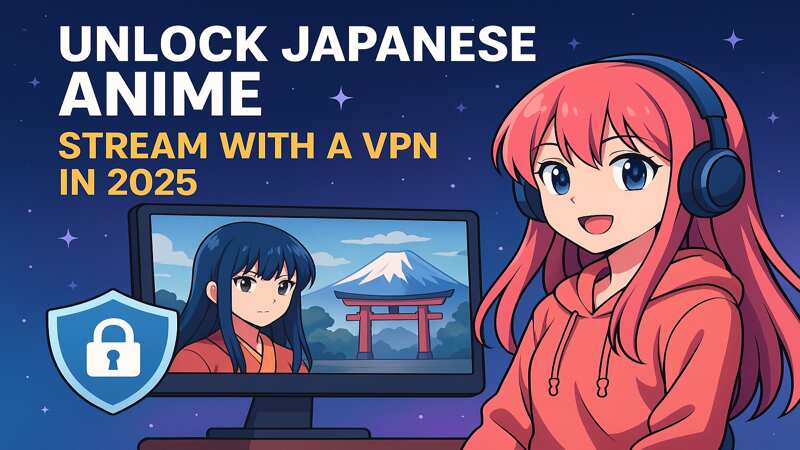With cybersecurity concerns on the rise in 2025, Virtual Private Networks (VPNs) have become essential tools for protecting your privacy, accessing restricted content, and maintaining online anonymity. But when it comes to choosing a VPN, one question often arises: Should you go with a free VPN or invest in a paid one? The debate of Free VPN vs Paid VPN 2025 is more relevant than ever.
In this guide, we’ll break down the key differences between free vs paid VPNs, their pros and cons, and help you decide which option best fits your needs in 2025.
Understanding VPNs: What They Are and Why You Need On
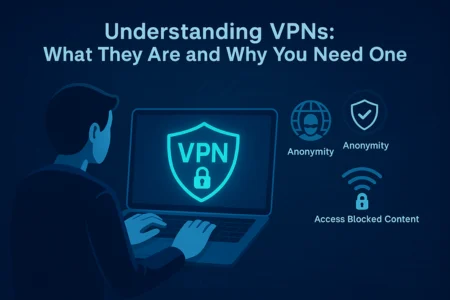
A VPN secures your internet connection by encrypting it and channeling your traffic through a protected server. This hides your IP address, making it harder for hackers, advertisers, and even your ISP to track your online activity. Whether you’re working remotely, streaming, gaming, or traveling, a VPN ensures a safer, more private experience.
If you’re searching for secure VPN options or the best VPN for streaming in 2025, understanding the differences between free and paid services is key. Knowing the free VPN risks can help you avoid vulnerabilities.

- 9.8
- The fastest and most reliable VPN on the market

- 9.5
- Low-cost VPN offering unrestricted device usage

- 8.2
- Affordable new VPN launched by top industry professionals
Free VPNs: Pros and Cons
Pros | Cons |
Cost-Free Access – No payment required to start using. | Data Caps – Limited bandwidth or slower internet speeds. |
Basic Anonymity – Basic encryption and location masking. | Fewer Servers – Limited server choices cause overcrowding and reduced speed. |
Trial Opportunity – Great for testing VPN features risk-free. | Security Risks – Some may log or sell your data, raising privacy concerns. |
Free VPN App – Numerous providers offer applications for Android and iOS devices. | Streaming Limitations – Often can’t unblock Netflix, Hulu, etc. |
Browser Support – Easy setup via browser extensions. | Ads & Tracking – Monetization may involve ads or browsing activity tracking. |
PC Download Limitations – Fewer features compared to premium desktop versions. | |
🌍 Site Reliability – Limited support, slow updates on free VPN websites. | |
App Download Risks – Some apps may carry malware or adware. | |
Android Compatibility – Restrictions on speed, servers, and app stability. | |
Varied Download Quality – Must choose reputable sources to avoid fake software. |
Paid VPNs: Pros and Cons
Pros | Cons |
Faster Speeds – Higher bandwidth and consistent performance. | Cost – Requires a monthly or yearly subscription. |
Advanced Security – Strong encryption, no-logs policy, kill switch, and leak protection. | Overkill for Casual Use – May be unnecessary for minimal or infrequent usage. |
Wider Server Access – Thousands of servers worldwide for better speed and geo-unblocking. | |
Dependable Streaming – Accesses platforms like Netflix, Hulu, and BBC iPlayer effortlessly. | |
Customer Support – 24/7 live chat or email assistance ensures smooth operation. |
Key Factors to Consider in 2025
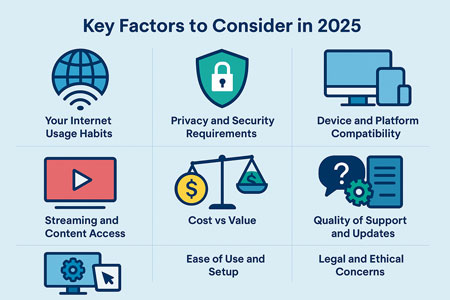
Free vs Paid VPNs: Key Comparison
Deciding between a free VPN and a paid VPN in 2025 hinges on several key factors.Here’s a detailed look at what matters most:
- Your Internet Usage Habits
Are you just browsing occasionally, or do you stream, download, and game regularly? While a free VPN might be sufficient for light use, heavier users often discover that a paid VPN provides far better performance and reliability. For those seeking the best VPN for streaming in 2025, free options are generally inadequate. - Privacy and Security Requirements
Free VPN risks include weak encryption, lack of no-log policies, and even malware in some cases. A paid VPN, on the other hand, typically provides top-tier secure VPN options, giving you full peace of mind. If your goal is true privacy in 2025, don’t compromise—choose a trusted paid VPN. - Device and Platform Compatibility
Looking for a free VPN app that functions smoothly on all your devices? While some free VPN Android apps are decent, paid VPNs generally support a wider range of platforms with better user interfaces. They offer robust support for PC, macOS, Linux, mobile, and even routers. - Streaming and Content Access
For streaming enthusiasts, the top VPN for streaming in 2025 is typically paid. Free services are inconsistent and often blocked by popular platforms. A paid VPN gives you access to high-speed servers optimized for Netflix, Disney+, Hulu, and more. - Cost vs Value
It’s easy to think a free VPN is good enough, but once you factor in speed, features, and privacy, a paid VPN becomes a smarter investment. When comparing free VPN vs paid VPN in 2025, think long-term. Wondering if a paid VPN is worth the cost? For most users, the answer is yes, particularly when protecting your data is a priority. - Quality of Support and Updates
Free VPN sites may lack regular updates and have slow or no support. With a paid VPN, you’ll usually get 24/7 assistance, automatic updates, and a team that addresses vulnerabilities fast, ideal in today’s ever-changing threat landscape. - Ease of Use and Setup
Searching for an easy-to-use, free VPN download? You’ll find better UI/UX with premium providers. Plus, with free VPN PC download versions, you may need extra configuration, while paid VPNs often offer one-click setup. - Legal and Ethical Concerns
Many free VPN apps are funded through ad tracking, and some even sell user data. Using a free VPN browser extension might expose your history to third parties. A paid VPN respects your data and ensures full compliance with privacy laws.
Feature | Free VPNs | Paid VPNs |
Cost | $0 | Typically $2–$12/month |
Speed | Slow to moderate | Fast and reliable |
Data Limits | Often capped (500MB–10GB) | Usually unlimited |
Security Features | Basic | Advanced (kill switch, split tunneling, etc.) |
Ads | Frequently displayed | Ad-free |
Server Locations | Limited | Extensive global coverage |
Customer Support | Usually none | 24/7 live chat or email support |
Logging Policies | Often unclear | Transparent, no-logs policies |
When to Use a Free VPN
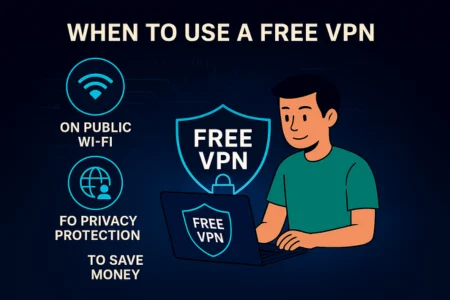
There are specific cases when a free VPN makes sense, especially if you’re looking for convenience without a subscription fee. Here’s when using a free VPN app, free VPN Android, or free VPN browser might be the right move:
- Casual Browsing: If you’re just checking email, reading news, or accessing unsecured networks occasionally, a free VPN app provides essential protection without costing a dime. Many people opt for a quick free VPN download for this reason.
- Public Wi-Fi Security: When using public hotspots at cafes, airports, or hotels, a free VPN PC download or a free VPN Android can help shield your data from prying eyes.
- Trying Before Buying: Not ready to commit to a paid VPN? Use a free VPN site to test basic features and interface. This helps you evaluate performance and ease of use before deciding.
- Light Streaming or Geo-Bypassing: Some free VPN browser extensions allow access to geo-blocked content like YouTube or news sites. While not ideal for high-speed streaming, they serve the purpose for light users.
- Limited-Time Use: Traveling for a short time or needing temporary access to a blocked website? A fast download of a free VPN app or free VPN for PC can get the job done.
When to Choose a Paid VPN
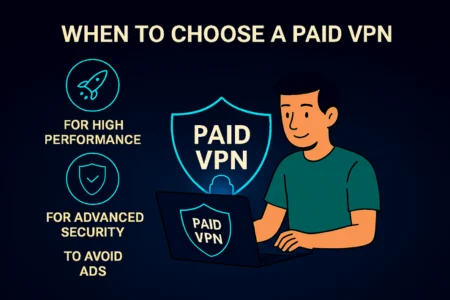
There are many situations where choosing a paid VPN over a free option becomes essential. Here’s when investing in a paid VPN truly pays off:
- Heavy Streaming and Gaming: If you stream movies in HD or play online games, a paid VPN is the best choice. Unlike a free VPN, which often lags or buffers, a paid VPN offers faster, more stable connections with unlimited bandwidth.
- Advanced Security Needs: When dealing with sensitive work documents, financial transactions, or confidential information, a paid VPN provides high-end encryption and zero-log policies that a free VPN app usually lacks.
- Remote Work and Business Use: Professionals working from home or abroad require consistent and secure access to business tools. A paid VPN ensures a stable and secure connection that’s critical for productivity.
- Bypassing Censorship and Firewalls: In countries with restricted internet access, only a reliable paid VPN can consistently bypass firewalls. Unlike some free VPN site services that get blocked easily, paid VPNs rotate servers and IPs to maintain access.
- Privacy-Focused Users: If you’re serious about online privacy, a paid VPN is a necessity. It offers no-logs policies, advanced features, and complete anonymity, whereas a free VPN app download might compromise your data for ad revenue.
- Multi-Device Protection: A single paid VPN subscription often covers multiple devices, including your PC, smartphone, and even your smart TV. Free services like free VPN Android or free VPN PC download usually limit you to one device.
- No Data Caps: Most free VPN downloads come with strict data limits. With a paid VPN, you get unlimited usage, which is crucial for streaming, downloading, or working online.
If you value consistent performance, top-tier security, and premium support, a paid VPN is worth the investment over any free VPN browser or free VPN site alternative.
Choosing Between a Free VPN and a Paid VPN
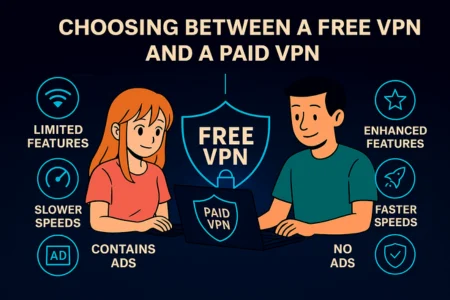
Making the right choice in the free vs paid VPNs debate depends on your personal needs and how you use the internet. If you’re a casual browser or someone just testing the waters of online privacy, a free VPN app or a free VPN download might be sufficient for your use. Whether it’s a free VPN Android, a free VPN PC download, or a browser extension like a free VPN browser, free tools can help you get started.
However, if you’re looking for reliability, security, speed, and long-term performance, a paid VPN is undoubtedly the better option. From unlimited bandwidth and 24/7 support to better privacy policies and more server locations, a paid VPN covers all bases. When considering free vs paid VPNs, think beyond the price—think about your privacy, streaming needs, and how much value you place on your online identity.
Remember, not all free VPN site options are trustworthy, and not every free VPN app download offers the protection you might expect. When privacy, speed, and security are top priorities, a paid VPN is a smart investment.
Whether you’re starting with a free VPN download or going directly to a premium service, your decision in the free vs paid VPNs discussion should reflect your digital lifestyle and security expectations.
Although free VPNs can be helpful in certain cases, they frequently have restrictions and raise privacy issues. If you value online security, privacy, and performance, opting for a paid VPN is the wiser decision. However, if you’re looking for a free VPN download, a free VPN site, or a quick free VPN app download, be sure to research carefully.
Frequently Asked Questions (FAQs)
Is a free VPN good for streaming?
A free VPN can unblock basic content, but it’s often slow or capped in bandwidth. For uninterrupted HD streaming, nothing beats a premium VPN.
Can I download a free VPN for my PC?
Yes, there are many free VPN PC download options available. Just be sure to choose one from a reputable free VPN site to avoid malware.
What is the best free VPN app for Android?
There are several popular free VPN Android apps, but always check reviews and privacy policies before downloading a free VPN app.
Are paid VPNs more secure than free VPNs?
Absolutely. Paid VPNs offer advanced features like kill switches, split tunneling, and no-log policies that most free VPNs lack.
Can I try a VPN for free before paying?
Numerous paid VPNs provide money-back guarantees or short-term trial periods. You can start with a trusted free VPN download to test basic functionality.

